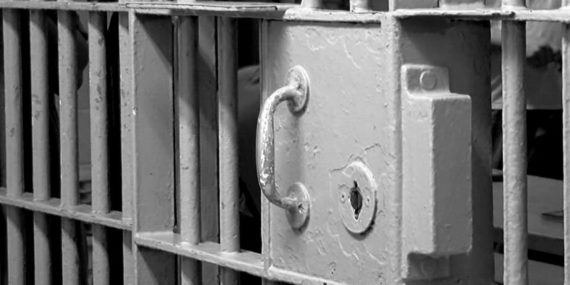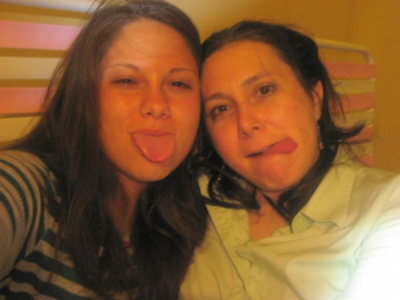
Mother struggles to get daughter released from Jefferson Parish Correctional Center after seven months and mounting charges (photo source WVUE)
(11-4-20) This is the second in a two part account of Lisa Aneiva’s attempt to help her daughter, Mariel Vergara, who has a mental illness, PTSD and autism.)
Janet Hays first heard about a young Hispanic woman being held in disciplinary lockdown inside the Jefferson Parish Correctional Center from a source in law enforcement who was concerned because Mariel Vergara was clearly mentally ill and was racking up more and more criminal charges while incarcerated.
Mariel’s arrest had been a big news story, especially in New Orleans, after she walked naked into a terminal at the Louis Armstrong New Orleans International airport in April and demanded to buy a ticket. Deputies were called. There was a confrontation and Mariel was arrested on 5 charges, only to have six more criminal charges added while she was in jail awaiting trial.

Janet Hays, mental health advocate
Janet had began advocating for better mental health care in her state after a close friend died in 2009 because she couldn’t get mental health care. Hurricane Katrina had devastated the city in 2005 closing Charity Hospital, where her friend always had been treated. The hospital had 128 long-term psychiatric beds and 50 crisis stabilization beds. Janet urged the state to convert the hospital into a modern mental health care and research center but developers were smacking their lips at converting the downtown New Orleans property into condos and shops. Janet initially formed Healing Minds NOLA, a non-profit advocacy organization, as part of her Charity Hospital campaign. Since then, Healing Minds has expanded into other advocacy efforts. Most recently, Janet broadcasts webinars with guests, including such heavy-weights as U.S. Senator Dr. Bill Cassidy (R.). Even the police have asked her for help dealing with seriously mentally ill residents who are homeless.
Mariel’s mother, Lisa Aneiva, was learning about Janet at about this same time. Lisa, who lives in Northern Virginia, was happy to accept Janet’s help. She told the advocate that she feared Mariel’s mental illness was getting worse in jail. Studies have shown that prolonged isolation while incarcerated exacerbates mental illnesses. Janet was familiar with stories of inmates with mental illnesses in Louisiana being held in isolation cells, often naked in the dark for long periods. The Jefferson Parish Correctional Center also had made headlines after four inmates committed suicide, the last while waiting for a repeatedly delayed mental health examination.
When Lisa explained that Mariel had been found competent, Janet contacted a forensic psychiatrist who offered to reevaluate Mariel without charge. If deemed incompetent, Mariel would be transferred to a 600 bed forensic hospital in Jackson, LA., where her symptoms could be addressed. But the public defender representing Mariel didn’t want to pursue that offer.
Getting Out Before New Charges Are Filed
“I want my daughter out of jail as quickly as possible,” Lisa said. She was fearful deputies would continue filing charges against her daughter.
Janet searched for a law firm that would be willing to represent Mariel without charge, but none would. Mariel already had a public defender. Why did she need a pro bono attorney?
Lisa felt frustrated. She didn’t feel the public defender was working toward getting Mariel released. Janet put Lisa in touch with Rachel Isabel Conner, a New Orleans attorney with a penchant for underdogs and controversial criminal cases. She agreed to defend Mariel for a reduced fee. Lisa said, “I was so grateful.”
“Rachel told me we had two choices,” Lisa said. Push for another competency evaluation that could take months to arrange because of COVID or we could negotiate a plea bargain. “She’d try to get the charges against Mariel reduced down to misdemeanors.”
On Oct. 21st, a Wednesday, Mariel agreed to plead guilty as part of a deal and was sentenced to six months in jail on the original four charges stemming from the airport confrontation. The judge agreed to time served on the additional counts. By this time, Mariel had been in jail seven months, so the judge ordered her released.
Lisa was thrilled but Mariel was still confused and seriously ill. “Mariel didn’t have a phone or any cash. I didn’t want her walking out of the jail and being homeless in New Orleans, especially after Janet warned me that people in her condition are very vulnerable to being arrested again. In my mind, I could see a police officer asking her where she was going late at night and her yelling at him to F-off and being arrested again.”
Waiting In Her Car For Mariel’s Release
“I was afraid she’d disappear again,” Lisa explained. Mariel had told her earlier that she wanted to leave Louisiana, which meant going to the same airport where she’d been arrested to buy a ticket with her credit card. 
Lisa and Janet discussed options. Lisa could call 9-1-1 and ask a mobile crisis response team to evaluate Mariel as soon as she was released. But there was no guarantee a team would be sent in time to meet Mariel or that Mariel would be taken to a hospital that would admit her.
If Mariel was seen by a psychiatrist, that doctor could file a protective order, known as a Physician Emergency Certificate, to hold Mariel 72 hours for a civil commitment hearing. In Louisiana, the Coroner’s Office also could file a Coroner Emergency Certificate. Janet explained that Lisa could request an order through the coroner’s office too – any interested party in Louisiana could – but she’d have to submit evidence that showed Mariel needed to be hospitalized.
“I knew Mariel wouldn’t go to a hospital by herself,” Lisa said. “She didn’t think anything was wrong with her.”
Lisa decided to fly to New Orleans. She arrived Oct. 22, a Thursday. As she hurried through the New Orleans airport, she couldn’t help but think that this was where her daughter had walked in nude, scuffled with deputies and been arrested.
Janet was waiting. She had been in contact with a psychiatrist at the New Orleans University Medical Center Hospital who’d agreed to examine Mariel to determine if she met the state’s civil commitment criteria if they could get her from the jail to the UMC emergency room.
“I didn’t know when she would be released,” Lisa said. She also wasn’t certain how she would convince Mariel to go with her to UMC. Mariel had grabbed the steering wheel and tried to crash or run the car off the road in the past when Lisa had been driving her somewhere she hadn’t wanted to go.
Emails and calls outside the jail
“You daughter will be released in two to four hours,” the deputy on duty told Lisa.
It was mid-morning. Lisa began pacing. Thinking about what she would say. Mariel was unaware that her mother had flown to New Orleans and was waiting at the jail for her.
Four hours passed. Lisa went up to the deputy on duty again.
“This morning you said my daughter would be released in two to four hours,” Lisa said. “It’s been four hours.”
“Ma’am, the process takes two to four hours.”
Lisa watched the door where Mariel would be freed. A woman appeared but it wasn’t her daughter. The released prisoner noticed Lisa and asked her if she could use her cell phone to call a friend to come get her. Lisa handed over her phone.
“Who you waiting for?” the woman asked.
“My daughter, Mariel,” Lisa replied.
“I saw two Latin women in there. One was so beat up that her eye was swollen shut and she had been crying for several days. It might be your daughter but I don’t know.”
Lisa felt panicky. She began to think the worst.
The woman couldn’t get anyone to come get her. She began to cry. Lisa offered to pay for an Uber for her.
At five p.m., deputies told Lisa couldn’t stay in the lobby. There was a no loitering sign. She’d have to move outside to the steps of the building.
Lisa sent Janet an email.
I don’t have a lot of confidence that they will give her the information to call me when she gets out so I am waiting at the door. In the meantime, I learned that she wrote a letter to her dad that he got today. It basically says goodbye because she doesn’t want to live anymore. He said it talks a lot about death.”
Janet made some calls and called back. Mariel’s mention of suicide wasn’t going to help them get her committed because the letter was older than 72 hours. Mariel would have to have mentioned suicide within the last 72 hours.
An email from Lisa to Janet:
They kicked me out of the lobby. So I went out on the porch. They released three male prisoners who sat down on the porch next to me. I was scared to death. They kept looking at me and one of them asked me for a light. Another had a knife and he got it out and he was looking at it and then looking at me.
She called Janet. “You’re not safe,” Janet warned. “Go get your car.”
Lisa was hesitant. Her car was parked two blocks away. What if Mariel came outside? What if the man with the knife was still there when Mariel came out?
Lisa ran down the street to retrieve her car. She parked illegally across from the jail’s entrance door. The man with the knife was gone. She used her phone to check the jail’s website. Mariel was still listed as being a prisoner. She’d not been released.
“I’m going to try to stay here all night in case they try to release her at 4 o’clock in the morning or something. I don’t want to leave and not be here to take her directly to the hospital, since there is a chance that she could end up in the jail with new charges and we would have to start this process all over again.”
Afraid to leave her car to eat or even to find a bathroom, Lisa began using her phone to document what she was seeing with photos and then sending emails to Janet.
They released another male at 2 a.m., he walked up the street and disappeared. At 3:15 am they released a female. She walked up the street for about five minutes, then came back, then she left her bag on the steps, went inside the office and came out again after several minutes. After that she approached me and asked if she could pay me to drive her since she could not find a taxi. She told me that she lives too far away to walk (not to mention that it’s dangerous for a female to be on the streets alone at 3 AM! ) and that the correctional center refused to call a cab for her. Apparently, she had her baby in the Jail on October 3 and this is the first time she was able to see her baby since they took it away at birth. Of course, I did not want to leave in case Mariel was released so I paid for her Uber to get home.
At 5 am, a truck came and they put a body into it from the jail. What if it is Mariel?
Lisa called Janet, who promised to try to find out who had died. Lisa called Rachel Conner at day break. She promised to call the jail but warned Lisa to stay out of the lobby. Better not to irritate the deputies by going inside and asking. Legally, they could delay Mariel’s release until Monday if they wanted, she was warned.
Maybe it was a lack of sleep. She couldn’t keep from seeing images of Mariel badly injured. Mostly she was scared. Her phone rang. It was a relative who’d been checking the jail’s website. Family members had been keeping a watch on the site. It listed Mariel as having been released minutes earlier. Lisa called Janet who hurried over to the jail.
Mother and daughter reunited – for a few hours.
Lisa could see Mariel through a small window. She looked disheveled but was alive and safe. Lisa let out a cleansing breath through her COVID mask. As soon as Mariel stepped into the lobby, Lisa rushed up, expecting a hug. Possibly tears.
“Who the fuck are you masked lady?” Mariel sneered. “Get out of my way, I have to go to the bathroom.” She brushed passed Lisa. Janet decided to drive to the emergency room at UMC to alert the psychiatrist, who she knew, that Mariel would be coming.
Mariel emerged from the bathroom.
“Mariel,” Lisa said. “It’s mom.” She wasn’t certain Mariel recognized her.
“I’m hungry.”
“What do you want to eat?”
“Everyone said I should eat a Po Boy.”
“Let’s go find one.”
Lisa insisted Mariel sit in the back seat of the rental. As they were pulling away from the jail, Janet sent her a text. She wasn’t certain UMC hospital would take Mariel. Janet told her to drive to St. Charles Parish Hospital, which was further away. Janet had called a doctor there and he was willing to examine Mariel.
Lisa asked Mariel about how she was treated in jail. “I’m going to sue them,” Mariel said.
Lisa saw an opportunity. “If you want to sue, we need to document your injuries. We should go to a hospital and get you checked out.”
Mariel became quiet. She had told her mother that she wanted to go to the airport after they found a Po Boy.
“Okay,” she said.
When they got to the emergency room, Mariel sat down on the floor.
“Are you employed?” a nurse asked.
“No.”
“Why did you come to New Orleans.”
“My boss sent me.”
After several stressful minutes, a doctor arrived and he admitted Mariel as a patient.
What Should Have Happened
An email from Janet:
Mariel should never have been taken to the jail in the first place where it took an army of people to pry her out of there. (Sad about all those poor people who don’t have family and advocates on the outside working for them). They have very well-trained crisis intervention team sheriffs in Jefferson Parish. Why weren’t they dispatched? I believe they would have taken her to a hospital. Of course, she probably would have just been stabilized and released so her destination might have been jail anyway.
The second outstanding thing for me is … had she been evaluated incompetent to stand trial, she would’ve been transferred to our forensic hospital in Jackson Louisiana that has 600 beds. It’s operated by the Tulane Dept Of Psychiatry. The doctor she’s with now is one of the forensic doctors who sees patients up there. From what I’ve seen, she probably needs to be in a long-term secured residential facility of some sort to deal with her multiple issues stemming back to when she was very young.
Because she was not transferred, they put her in solitary confinement rather than a hospital.
This case highlights absolutely everything that’s wrong with the broken system. In my opinion. Here’s what should’ve happened:
Sheriffs arrive at the airport and take Mariel to a hospital. Hospital contacts family and works together with family to get her history and make a good treatment decision. Depending on her needs, treatment is coordinated and services are available. Insurance covers it.
How hard is that?
It’s Not Over
After two days of little sleep, Lisa flew home to Virginia. Mariel was safe. But something Mariel had said at the hospital continued to nag at her. Mariel claimed the jail was planning on filing more criminal charges against her. Lisa decided to call Attorney Rachel Conner.
What Mariel turned out to be true. The jail was preparing more charges.
“I couldn’t believe it! Why is it so impossible to get my daughter help?” Lisa asked.

Happier Times: Mariel and her mother, Lisa
“



